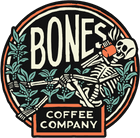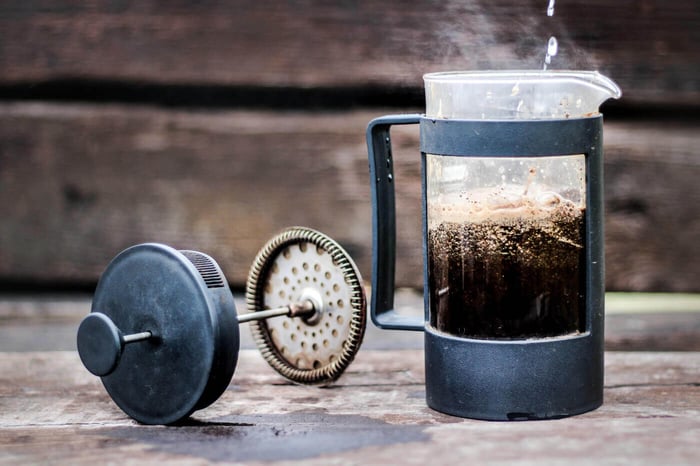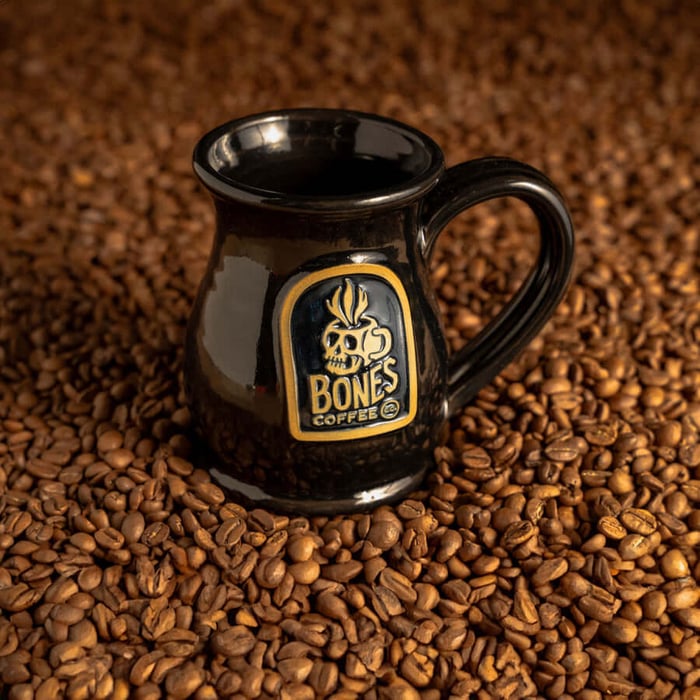Have you ever wondered if that morning brew could actually help shed a few pounds off your belly fat?
In this article, we’ll explore the science behind coffee, body weight, and weight loss. We’ll answer some of the most frequently asked questions about the potential of caffeine consumption to support weight loss.
How Does Coffee Affect Metabolism and Weight Loss?
Does increasing your coffee intake affect your body weight? Well, it’s not that simple.
Coffee contains compounds such as chlorogenic acid that can potentially boost metabolism, which could help you burn body fat and lose weight. The most well-known of these is caffeine, a natural stimulant that can increase the rate at which your body burns calories.
But caffeine isn’t the only player here; coffee also contains chlorogenic acid, which has been shown to slow down the absorption of carbohydrates and fats, potentially aiding in weight loss.
So, how long does this metabolic boost last? Typically, the effects of caffeine can kick in within 15 minutes and last up to several hours. However, the duration and intensity can vary depending on individual tolerance and the amount of coffee consumed.
Here are some key points to consider:
- Caffeine content: A standard cup of coffee contains about 95 mg of caffeine, but this can vary widely depending on the type of coffee and how it’s brewed.
- Metabolic rate: Research suggests that caffeine can increase your metabolic rate by 3-11%, with larger doses having a more significant calorie-burning effect.
- Fat oxidation: Caffeine can also enhance fat oxidation, allowing your body to burn fat stores for energy during exercise.
It’s also worth noting that the metabolic boost from coffee can be more pronounced in lean individuals compared to those who are obese. This means that your current body composition might influence how effective coffee is at boosting your metabolism.
How Does Coffee Intake Affect Weight Loss?
Caffeine intake is often regarded as a healthy practice due to its different health benefits, such as better glucose processing and boosting the immune system. But how exactly does it influence fat burning?
When you consume caffeine, it stimulates the nervous system, which sends direct signals to the body’s fat cells, helping break down fat. This process is known as lipolysis.
Essentially, caffeine increases the levels of the hormone epinephrine (adrenaline) in your blood. This prompts the hormones to travel to the fat tissues and signals them to break down fatty acids and release them into your blood.
Here are a few ways coffee intake can affect weight loss:
Bigger Energy Usage
Caffeine can boost your metabolic rate, which means you burn calories even when you’re at rest. This leads to a higher overall calorie count burned throughout the day.
Studies have shown that drinking around four cups of coffee can increase your resting metabolic rate by 3-11%. The higher your metabolic rate, the easier it is for you to burn body fat and lose weight.
Boosted Physical Performance
It’s not uncommon to notice people who drink coffee, energy drinks, or other caffeinated beverages as more energetic. This is because caffeine can improve a person’s physical activity by increasing adrenaline levels.
Greater adrenaline levels make your workouts more effective, helping you burn more calories. It’s like getting a little extra push to go that extra mile.
Bringing the Heat
The chlorogenic acids in coffee can increase thermogenesis, the process by which the body generates heat, helping burn calories and potentially contributing to weight loss. Think of it as your body’s way of turning up the heat to burn fat.
Fewer and Lesser Cravings
Some studies suggest that caffeine can curb appetite, making you feel less hungry. This can help you consume fewer calories throughout the day, which is crucial for weight loss.
Coffee for Weight Management: The effects of caffeine can vary from person to person due to factors such as genetics, age, and caffeine tolerance. Some people may experience a significant boost in metabolism and fat burning, while others may not notice much of a difference. |
What Type of Coffee is Best for Weight Loss?
When it comes to weight loss, the type of coffee you drink can make a significant difference. Drinking unsweetened coffee is often touted as the best option for those looking to shed a few pounds, and for good reason.
Let’s explain why black coffee might be a better choice than coffee with cream and sugar. First, black coffee is virtually calorie-free, with a standard eight-ounce cup containing only about two calories. On the other hand, adding cream and sugar can quickly turn your low-calorie beverage into a high-calorie indulgence.
Choosing a lighter plant-based option, such as oat milk, can provide the creaminess you want with fewer calories and added nutrients, making it a smart choice from a clinical nutrition perspective.
Here’s a quick comparison:
Coffee Type | Calories (per 8 oz) |
Black Coffee | 2 |
Coffee with 1 tbsp Cream | 52 |
Coffee with 1 tsp Sugar | 16 |
Coffee with Cream & Sugar | 68 |
As you can see, just a teaspoon of sugar or artificial sweeteners can make a world of difference to your weight loss journey. Those extra calories can add up quickly, especially if you’re drinking multiple cups a day. Over time, these additional calories can hinder your weight loss efforts.
Opt for high-quality beans and experiment with different brewing techniques such as French press, pour-over, or cold brew to find what you enjoy the most.
For consistent portion control and calorie counting, our Bones Cups Single Serve collection makes it easy to track precisely how much coffee you're consuming while enjoying premium flavors.
Is Drinking Black Coffee Better for Weight Loss?
Another point to consider is the impact of added sugars and fats on your metabolic rate.
Consuming sugar can lead to spikes and crashes in your blood sugar levels, increasing sweet cravings and making it harder to stick to a healthy lifestyle. Cream, especially if it’s high in saturated fat, can also contribute to weight gain and other health issues.
If you find your coffee too bitter, there are low-calorie alternatives to cream and sugar that you might enjoy. For instance, you can try:
- Unsweetened almond milk: Adds a creamy texture with minimal calories.
- Stevia or monk fruit sweetener: Natural, zero-calorie sweeteners that won’t spike your blood sugar.
- Cinnamon: Adds a hint of sweetness and can help regulate blood sugar levels.
Another option is to choose naturally flavored coffees that provide sweetness without added calories. Our Blackberry Cobbler coffee delivers a sweet, dessert-like experience with zero sugar or artificial sweeteners.
Additionally, the type of coffee bean and brewing method can also influence the flavor, making black coffee more palatable. Opt for high-quality beans and experiment with different brewing techniques like French press, pour-over, or cold brew to find what you enjoy the most.
How Much Coffee Do I Need to Drink to Lose Weight?
Most experts suggest that drinking 3 to 5 cups of coffee per day can be beneficial for losing weight. This amount typically provides around 400 mg of caffeine, which is considered safe for most adults.
When figuring out how many cups of coffee you should drink to lose weight, it’s essential to strike a balance. Too little might not give you the health benefits you want, while too much can lead to unwanted side effects.
Here are some variables you need to consider:
Caffeine Sensitivity
If you’re sensitive to caffeine, you might want to start with just one cup and see how your body reacts.
Some people experience jitteriness or anxiety with even small amounts of caffeine. While drinking coffee can promote weight loss, these adverse effects can have a greater impact on your well-being.
Timing
Drinking coffee at strategic times can maximize its benefits. For example, having a cup in the morning can kickstart your metabolism, while a pre-workout coffee can enhance your exercise performance.
If you're pressed for time or need coffee on the go, consider our ready-to-drink options that deliver the same metabolic benefits without the brewing hassle.
Hydration
Coffee is a diuretic, which means it can lead to dehydration if you’re not careful.
Make sure to drink plenty of water throughout the day to stay hydrated.
Consult Professionals: Drinking coffee to increase fat-burning processes in the body does show some promise. However, don’t forget to consult a clinical nutrition expert before altering your diet. |
Are There Any Side Effects of Drinking Coffee for Weight Loss?
It’s important to know the potential side effects of drinking coffee for weight loss. While coffee can be a helpful addition to your weight management routine, it has some drawbacks.
Here are some side effects you might encounter:
Increased Heart Rate and Blood Pressure
People with certain medical conditions may have trouble with drinking coffee regularly, especially when it comes to their heart health.
Caffeine is a stimulant; it can increase your heart rate and blood pressure. If you have any pre-existing heart conditions, monitoring your regular coffee intake is crucial.
Digestive Issues
Coffee is acidic and can irritate your stomach lining, leading to issues like acid reflux or gastritis. If you have a sensitive or empty stomach, consider limiting your coffee consumption or opting for a low-acid variety.
Insomnia and Sleep Disturbances
Drinking coffee, especially in the afternoon or evening, disrupts sleep. Poor sleep can negatively impact weight management goals by affecting metabolism and increasing cravings for high-calorie foods.
Anxiety and Jitters
High caffeine intake can lead to feelings of anxiety and jitteriness. If you’re prone to anxiety, you might find that coffee exacerbates your symptoms.
Dependence and Withdrawal
Regular coffee consumption can lead to dependence. If you suddenly stop drinking coffee, you might experience withdrawal symptoms like headaches, fatigue, and irritability.
It’s always a good idea to listen to your body and adjust your coffee intake accordingly. If you experience these side effects, consider reducing your consumption or consulting with a healthcare professional.
Lose Weight and Drink Coffee the Novel Way
Dealing with body fat will be different for everyone since one person’s weight management program will not have the same effect on another person. You must be cautious about specific medications, treatments, and weight loss plans to determine their benefits.
While coffee can temporarily boost your metabolism, it’s not a magic bullet for weight loss. It’s most effective when combined with a balanced diet and regular exercise. So, enjoy your cup of coffee, but remember it’s just one piece of the puzzle.
Gaining weight doesn’t have to be a chore if you make the right decisions for your body. It’s important to enjoy your favorite morning brew in moderation, always be aware of potential side effects, and listen to your body.
If you want to enjoy coffee without feeling like you’re on a strict regimen, don’t be afraid to spice things up now and then. Our products at Bones Coffee Company can give you that extra boost of flavor to help you manage your weight loss journey!
We bring a novel twist to your daily coffee-drinking sessions with our wide selection of uniquely flavored coffee products. Browse our bestselling catalog today!





